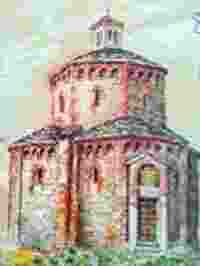Prophet

Habakkuk
Saint Abacuc, prophet, before the iniquity and violence of men foretold God's judgment, but also his mercy, proclaiming: "The just will live by his faith".
Roman Martyrology, 2 December, n. 1
Join us
Habakkuk Prophet
Habakkuk is from the sixth century BC, a contemporary of the prophet Daniel and the meeting between the two is narrated in the Deuterocanonical passage.
(Dn 14,33-39).
The moral state of Israel in the time of Habakkuk had sunk into a series of vices, over which a gross idolatry dominated by the exaltation of man prevailed, which indignant and saddened the prophet, who was nevertheless enlightened by divine teaching.
God is not indifferent to the iniquity of his people and chastises them through the Chaldeans. "How long, Oh Lord, will I cry, without your listening to me? I cry to you:" Violence! "And you do not save! Why do you show me iniquity and tolerate the spectacle of perversity? And why are they before me? robbery and violence? There are quarrels, and discord arises. Therefore the law is without force and the law does not lead, because the wicked bypasses the just, and the law is perverted".
(Ab 1,2- 4).
The drama takes place in Habakkuk's heart and conscience, anguish overwhelms him in front of what is happening and causes such painful questions to arise in him, that he strongly feels the need to abandon himself to God in order to be freed from the profound disturbance of him. He is a man of faith and asks himself "until when?", Suffering proves him; his faith needs to be supported in his weakness and enlightened by him, and he finds an answer in God's mercy. That cry "until when?" it is his cry of faith, that faith which already has the certainty of an answer in time and place on the part of God; however the wait is long and painful, and in it Habakkuk accepts the tribulation as a necessary test. Why does God allow evil? How is it possible that he forgets about him, defenseless in the midst of all the wickedness of man? The prophet receives an answer to his questions, which are also ours today: it is necessary to go through a painful time of learning, before understanding what God wants to produce in the hearts of his people, who are going through the days of trial.
"Perhaps against the rivers, Lord, against the rivers your anger is kindled or against the sea is your fury, when you mount upon your horses, upon the chariots of your victory? You draw your bow and satiate the string with lightning bolts; the mountains see you and tremble, a storm of water pours out, the abyss makes its voice heard. Above the sun fails to show itself, and the moon remains in its dwelling, they flee to the light of your arrows, to the dazzling splendor of your spear. In anger you cross the earth, you are angry you trample down the people. You have gone out to save your people, to save your anointed one.
You have demolished the top of the house of the wicked, you have undermined it to its foundations. With your darts you have pierced the head of his warriors who burst in to disperse me with the joy of those who devour the poor in secret. You drown his horses in the sea in the mud of great waters. I heard and my heart trembled, at this voice my lip trembled, decay enters my bones and my footsteps tremble beneath me. I sigh for the day of anguish that will come against the people who oppress us. In fact, the fig tree will not sprout, the vines will give no product, the olive harvest will cease, the fields will no longer give food, the flocks will disappear from the folds and the stables will be left without oxen".
(Ab 3,8-17).
Habakkuk understood that the final judgment of the nations and the disasters that will fall upon them have as their purpose the glory of God. He understands what the attitude of the righteous must be as they await the immense work of redemption. And he knows that God's thoughts are revealed only to men of faith, that faith that makes present the things that are hoped for and convinces about things that are not seen. And even if, under the yoke of human weakness, he complains that God does not listen to his cry, the Eternal never misses an opportunity to show him that he has listened to him: he explains to him how just are the judgments that he makes come down on his people and on the enemies of his people; and teaches him that the just has faith in him as a resource.
Although he initially complained of weakness of faith, now the prophet can exclaim that he has heard his message, because he has heard it: "now I have heard", I have the knowledge of your thoughts, I have grasped them by faith! God who hides nothing from him, treats him as a friend, reveals his most secret thoughts to him, and Habakkuk is now in full communion with his Lord; he understood: God has too pure eyes to bear the sight of evil, and now he rejoices in him, for the perfections of his actions and understands his love for him.
The prophet understands the teaching that is valid for every time and in every circumstance: "The just shall live by his faith"! The Lord recommends him to be patient, because the righteous must learn to live in conformity with faith, the only principle on which one can rely even in calamitous times. The journey of faith is wonderful because it elevates us above all obstacles, above our own experiences, and fixes our gaze on the things that are not seen, since the things that are seen exist for a limited time, those that are not seen are eternal!.
